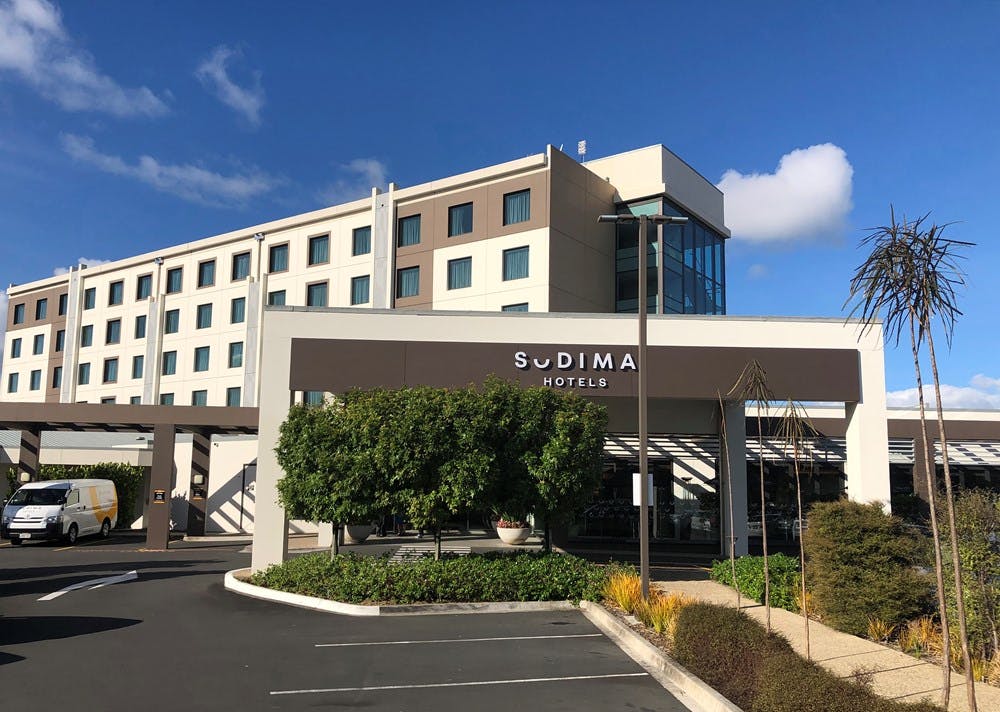The hotel industry produces a notoriously high amount of waste and contributes an estimated one per cent of the world’s emissions, which is set to increase as demand continues to grow.
To continue reading, subscribe to Eco‑Business.
There's something for everyone. We offer a range of subscription plans.
- Access our stories and receive our Insights Weekly newsletter with the free EB Member plan.
- Unlock unlimited access to our content and archive with EB Circle.
- Publish your content with EB Premium.
As executive director for sustainability and environment at Sudima Hotels/HIND Management in New Zealand, Kanika Jhunjhnuwala is determined to change this trajectory. Her efforts include establishing a policy to reduce and eliminate refrigerants through technology innovations such as chilled beams that cool and heat rooms through water flowing in a closed loop, and implementing a self-designed cloud-based Power Business Enterprise (BI) system to track and report building metrics as well as carbon emissions across the group’s hotels.
She has also led Sudima Hotels to improve staff welfare by paying them a salary 12 per cent higher than New Zealand’s minimum wage.
In 2021, Jhunjhnuwala made Sudima Hotels the first hotel in Australia and New Zealand to be signed to the Global Tourism Plastic Initiative (GTPI), which aims to root out plastic pollution by shifting the tourism sector towards a circular economy. Sudima Hotels is the only Toitū CarboNZero certified hotel chain in New Zealand.
Her continuous search for innovation and ways to expand her already wide range of sustainability weapons won her a place on Eco-Business’ A-List, which is a collection of movers and shakers in Asia Pacific’s sustainability scene. In her interview with Eco-Business, Jhunjhnuwala talks about what keeps her going on her sustainability journey and how to push for green initiatives in a historically emissions and waste-heavy industry built around comfort and luxury.
Which part of your work are you most passionate about?
We have a mission in Sudima Hotels and HIND Management to be the most sustainable and accessible hotel in the whole of Australasia – or even the world.
Accessibility doesn’t just affect people who have a permanent disability – it’s also people who have temporary access needs. For example, someone with a stroller, who has broken their leg, or anything like that.
The accessibility aspect is important because it means that you’re opening up your space to everybody – that’s the future [of hospitality].
What got you interested in sustainability?
I’ve always been interested in the environment and the outdoors. I also spend a lot of my time doing stuff like hiking, rock climbing and mountaineering.
What drives me is wanting to preserve all that nature and making sure that future generations get to see it.
Do you think ESG and sustainability had to take a step back during Covid-19?
I actually think that ESG became a bigger talking point during Covid-19 because many people I spoke to had a chance to step back and rethink their values. Some even had the chance to take a break from their work.
Because they had the chance to consider what they were going to do next, they could think about what they were passionate about and whether they should continue down the same career path. A lot of them also had time to reflect on what industry they wanted to be involved in.
I have friends who were only doing things for money and suddenly decided that they wanted more meaning in their life. So they switched to doing other things that still provided them with financial support but also had meaning beyond money.
Given that Sudima Hotels is a family-run business, what are the pros and cons of working with your family?
It’s really great. As a family-run business, you can think about what legacy you’re leaving behind rather than just profit. It’s also really good to be able to talk to everyone involved and highlight what’s important for us.
Cons could be how, even when I’m on holiday, my dad might start talking to me about work. It never ends.
Does being in New Zealand benefit your sustainability initiatives in any way?
New Zealand has this image of being very clean and green, so it definitely helps to make sure that what we offer is indeed clean and green as well. If there’s an initiative that I’m trying to put into the hotel, it is a little easier to get it approved because it’s what the entire country is marketed as.
However, that’s more of the smaller guest-facing things. There are lots of the same challenges that every business has, where it’s financial versus environmental.
In New Zealand, we have resources like the Energy Efficiency & Conservation Authority with which we are now working on a hotel decarbonisation plan. It looks at the whole hotel sector across New Zealand and how it can be decarbonised.
We’re having this conservation is because of the Hotel Industry Sustainability Group that we started and which some key players in the hotel industry have joined. They are interested in sustainability so we are looking at how we can signal to the government what we need help with and how we can move all hotels towards decarbonisation.
Sudima Auckland Airport became the first hotel in New Zealand to attain net-zero certification. Can you talk about how this was achieved?
We signed up for the Toitū CarboNZero programme in 2013 and it was a matter of creating a boundary for the hotel, so we knew exactly what we were using the certification for.

Sudima Auckland Airport was the first hotel in New Zealand to attain net-zero certification. Image: Hind Management.
We decided that it would mainly be the operations side, so we looked at obvious areas like energy and waste, then emissions associated with transport, refrigerants and a couple of other factors. Based on that, we measured our carbon footprint. Now that we had our base year and the numbers, we had something to start from. We bought registered carbon credits through the certification programme.
Later, more of the hotels [in New Zealand] came aboard the programme, with Christchurch Airport Hotel and Sudima Lake Rotorua Hotel joining in 2016 and 2017, and Christchurch City Hotel joining in 2019. The four hotels went through the carbon audit together and started measuring, mitigating and offsetting their emissions. We have a commitment that within two years of a hotel opening and running on a normal year, they will join the programme.
But what we’re doing differently now is that instead of offsetting, we’re going to reinvest that money into sustainability initiatives within the business and it basically becomes part of the ESG fund.
The money that would have been used to offset emissions will now help to meet the ESG targets that we’ve set, which can be about decarbonisation, cultural competency, social, or even accessibility as well. For us, sustainability is not just about the environment – it’s also about how we operate within communities and what we represent.
What is it like straddling the changes and sacrifices that come with going green?
Part of the problem is that people think going green is our attempt to save money rather than it actually being better for the environment. If you’re only doing one thing, then obviously people are going to think you’re just doing it to try and save money. But if you have other green or sustainable focuses in your business, they will be able to tell that you’re authentic and genuine.
But I also think that in tourism, especially in the hotel industry, people have this perception that if you go green it comes at the cost of luxury. But we can find ways around that.
We place go-green cards in the rooms and are looking at ways of incentivising this. We’re also trying to get rid of single-use items by replacing them with reusable items.
Many luxury items also come in a lot of packaging, so we’re trying to pick luxury items that come in sustainable packaging or have the New Zealand story as part of it. When you take it home, it will still be meaningful to you.
It’s definitely a journey and you don’t have to get it right the first time. The point is just to start. You might end up somewhere better than where you had expected, or you might have to go back and find a different solution.
We’re working with all of our suppliers to see if they can come up with [new sustainable initiatives and solutions], even if it means changing our operations a little bit. We’re also pushing them to come up with solutions where we invite them to sign our responsible procurement pledge and ask them what they can offer us that is in line with this.
Through those conversations, we’ve managed to get change quite a few things, like reusable coasters instead of paper ones, metal toothpicks for our cocktails, and tray coverings coated in different materials to allow them to be wiped clean instead of us binning them after each use. In the long run, these make a difference.
“
Sustainability is not just talking about your wins but also things that didn’t work. If we don’t hit our targets, we have to figure out why, and if there was something else we could have done instead.
Kanika Jhunjhnuwala
You’ve partnered with the Bank of New Zealand on a sustainability-linked loan. What is the significance of this?
It’s a really cool initiative – we talked to the Bank of New Zealand, which is the main bank that we use, and set up a sustainability loan with them. This means that we set up five targets over the course of our loan and each year is associated with a target. If we meet the annual target, we get a discount on our loan. If we don’t, then we get penalised.
It changed the way our business was thinking about sustainability because things were now linked to financial metrics. Having the financial instrument made the work more accountable and serious as well. I’ve been working on making sure that we are accountable for every metric and deliverable, to make sure they are as transparent as we want it to be.
I think that sustainability is not just talking about your wins but also things that didn’t work. If we don’t hit our targets, we have to figure out why, and if there was something else we could have done instead.
Since then, we’ve had a lot of feedback from different people and types of businesses asking us about the process. It’s really good to be able to share with them.
What advice would you give to other hotels that want to begin their green transition?
Just start. There’s no time like the present. Even if you mess up, it’s fine. You’ve done something and will be in a better spot than where you were when you started out. Even if you aim to do something like getting rid of all the single-use items from the kitchen but only end up getting rid of 10 per cent, that’s still better than zero.





















